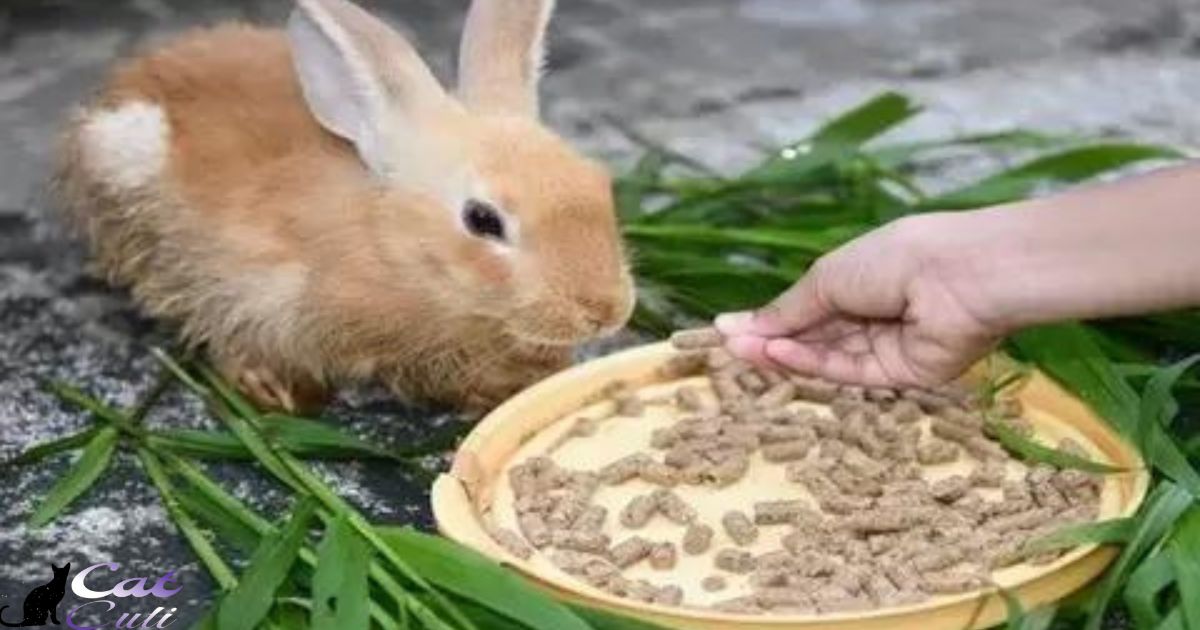Rabbits might eat cat food, but it’s not ideal for them. Cat food lacks essential nutrients rabbits need. It can cause digestive issues in rabbits if eaten regularly. It’s best to stick to a diet specific to rabbits for their health.
Curious about what happens when fluffy bunnies encounter a bowl of cat food? Wondering, Will rabbits eat cat food? The answer might surprise you! Discover the truth behind this furry dilemma and explore why it’s not just about whether they’ll eat it, but whether it’s good for them.
Wondering if rabbits will eat cat food? While rabbits might nibble on cat food, it’s not their ideal diet. Cat food lacks essential nutrients crucial for a rabbit’s health and can lead to digestive issues. Stick around to learn more about what’s best for your fluffy friends.
Can rabbits eat dog or cat food?
Rabbits can nibble on dog or cat food, but it’s not recommended. These foods lack vital nutrients essential for a rabbit’s well-being. Feeding rabbits dog or cat food regularly can cause digestive problems.
It’s best to stick to a diet specifically designed for rabbits. Their nutritional needs differ from those of dogs and cats. Opt for hay, fresh veggies, and specially formulated rabbit pellets to keep your bunny healthy and happy.
Potential Side Effects of Eating Dog or Cat Food
Eating dog or cat food can have side effects. These foods might lack the right nutrients for humans, leading to deficiencies. Consuming them regularly could upset your stomach or cause nutritional imbalances. It’s essential to opt for food specifically designed for humans to maintain a balanced diet and avoid potential health issues.
Kidney Damage
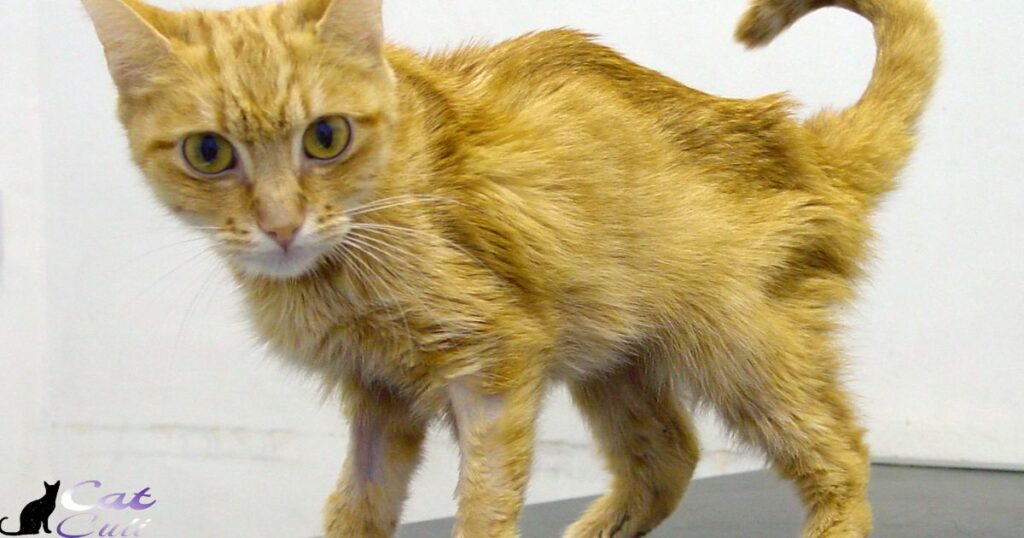
Kidney damage refers to impairment or harm to the kidneys’ function. Conditions like chronic kidney disease, infections, or certain medications can cause damage. It may lead to decreased kidney function, affecting the body’s ability to filter waste and maintain balance in fluids and electrolytes.
Urinary Tract Infections
Urinary tract infections (UTIs) occur when bacteria enter the urinary system and multiply, causing infection. Common symptoms include a frequent urge to urinate, burning sensation during urination, and cloudy or bloody urine.
Dental Damage
Dental damage refers to harm or issues affecting the teeth and oral structures. It can include conditions like tooth decay, gum disease, enamel erosion, or dental injuries. Neglecting oral hygiene, consuming sugary foods, or poor dental care habits can contribute to various forms of dental damage.
Other Hazardous Food NOT Suitable For Rabbits
Rabbits should steer clear of certain foods that can be harmful. Foods like chocolate, sweets, and salty snacks aren’t suitable for these furry pals. These items can upset their delicate digestive systems and cause health issues.
Moreover, avoid feeding rabbits human food leftovers. Foods high in sugar, such as cakes and candies, pose risks. Stick to a diet specifically designed for rabbits to keep them healthy and happy.
Cat Food vs. Rabbit Food
| Criteria | Cat Food | Rabbit Food |
| Ingredients | Contains meat and specific nutrients | Contains fibers, greens, and pellets |
| Nutritional Value | Tailored for cats’ dietary needs | Tailored for rabbits’ digestive systems |
| Protein Content | High protein content | Moderate protein content with fibers |
| Fiber Content | Low fiber content | High fiber content for digestive health |
| Recommended for | Cats | Rabbits |
Preventing Your Rabbit From Eating Cat Food
Stop your rabbit from eating cat food by storing it securely out of reach. Keep the food in sealed containers or elevated spots. Monitor feeding times to ensure your rabbit only eats their designated food.
Introduce barriers or use pet gates to separate the areas where cat food is kept from where the rabbit roams.Additionally, establish a consistent feeding routine for your rabbit. Offer them their meals in a designated feeding area, away from the cat’s feeding zone.
This helps your rabbit understand their feeding space and reduces the chances of them sneaking into the cat’s area for food. Remember, proactive measures and a structured routine can effectively prevent your rabbit from consuming cat food.
Suggested Food For Rabbits
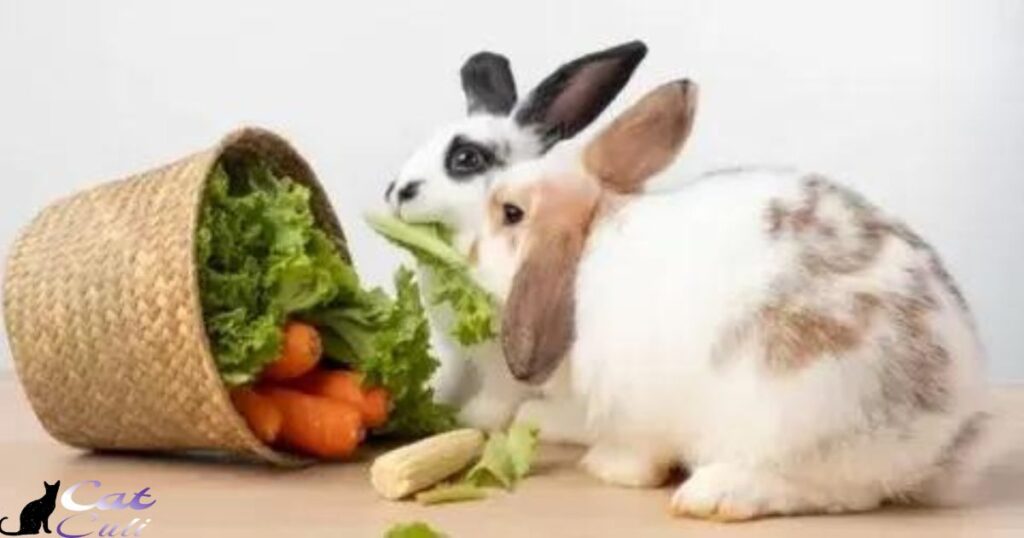
Rabbits thrive on a diet rich in hay, fresh vegetables like kale and carrots, and high-quality rabbit pellets. These pellets contain essential nutrients for their growth and well-being. Remember, a balanced diet keeps bunnies healthy and happy.
Offer a variety of greens to your furry pals, such as spinach and parsley, but in moderation. These leafy delights add diversity to their meals, ensuring they get a mix of nutrients. Always ensure freshwater is available for your rabbits—they need it for digestion and overall hydration.
Safe Treats For Rabbits
Rabbits enjoy safe treats like fresh veggies and fruits. These treats provide essential nutrients and keep them happy. It’s crucial to avoid sugary or fatty foods as they can upset a rabbit’s stomach. Stick to safe options for a healthy, hoppy bunny.
When offering treats, opt for leafy greens such as parsley or kale. These are nutritious and keep rabbits entertained. Remember, moderation is key to maintaining a balanced diet for your rabbit.
See More Animals
This section typically showcases additional animals or content related to the main topic or category. It allows users to explore a broader range of animal-related information or images.
Related Posts
Related Posts are articles or content pieces that are similar or connected thematically to the current topic. They help users discover more information or perspectives on a particular subject.
Popular Posts
These are articles or content pieces that have gained significant attention or engagement from users. They often reflect trending or widely appreciated topics within a specific website or platform.
Editor’s Picks
Editor’s Picks highlight content chosen or recommended by the editorial team. These selections could be based on quality, relevance, or uniqueness, offering users a curated collection of the best or most interesting content available on a website or platform.
Can You Give Cat Food To A Rabbit?
Sure, giving cat food to a rabbit isn’t recommended. Cat food lacks the nutrients rabbits need for their well-being. Feeding cat food to rabbits might lead to digestive problems and could harm their health. It’s better to provide rabbits with a diet tailored specifically to their nutritional needs.
Rabbits have sensitive digestive systems, so it’s important to offer them food that suits their requirements. While they might try cat food out of curiosity, it’s not a suitable or healthy option for their regular diet. Opting for rabbit-specific food ensures they receive the proper nutrients essential for their growth and vitality.
Why Cat Food Is Bad For Rabbits
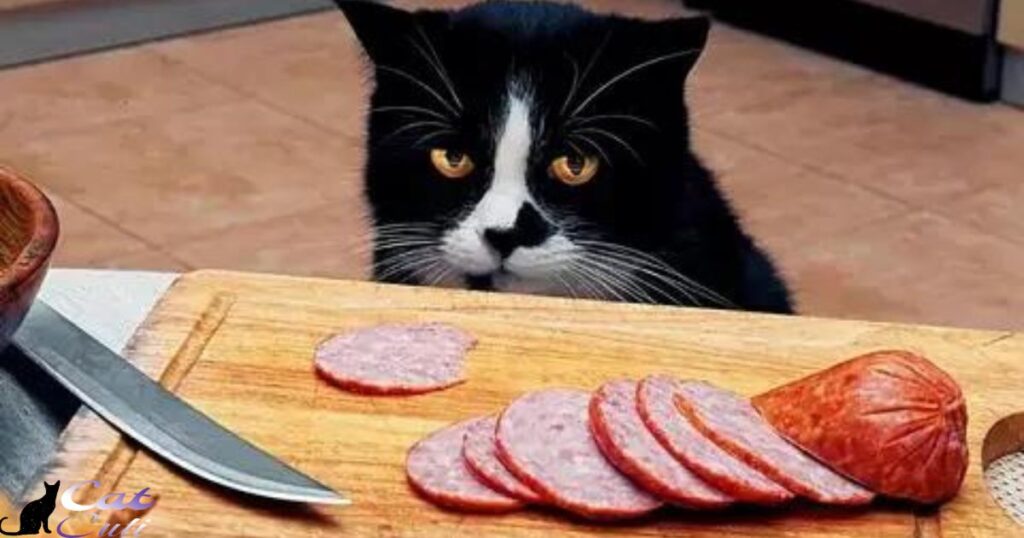
Cat food harms rabbits as it lacks vital nutrients crucial for their health. It can cause digestive problems due to its unsuitable composition for rabbits’ digestive systems. Feeding cat food to rabbits might result in deficiencies and long-term health issues.
Rabbits need a specific diet tailored to their nutritional needs to stay healthy and active.The imbalance in nutrients found in cat food can adversely affect a rabbit’s well-being. Cat food lacks the fiber and appropriate protein levels essential for rabbits.
Feeding them cat food regularly can lead to malnutrition and digestive disturbances. Opting for a diet formulated for rabbits ensures they receive the necessary nutrients for a thriving life.
Can Rabbits Eat Wet Cat Food?
Rabbits should avoid wet cat food as it lacks vital nutrients. Chickens eat cat food but for rabbits, it’s unsuitable, lacking necessary fiber and nutrients crucial for their digestion. Opt for a rabbit-specific diet to ensure their health and happiness.
Offering wet cat food to rabbits isn’t recommended. It lacks the nutrition that rabbits require. Their digestive systems aren’t well-suited for cat food, so it’s best to opt for food formulated for rabbits to ensure their well-being.
Can Rabbits Eat Dry Cat Food?
Rabbits can eat dry cat food, but it’s not recommended. Dry cat food lacks the specific nutrients rabbits need for a balanced diet. Feeding it to rabbits regularly might cause health issues due to the differences in nutritional requirements between cats and rabbits.
It’s crucial to provide rabbits with a diet rich in hay, fresh vegetables, and rabbit-specific pellets. While a bite of cat food might not harm them, relying on it can lead to nutritional deficiencies in rabbits. Always opt for a diet tailored to meet a rabbit’s specific nutritional needs.
Differences Between Cat Food and Rabbit Food
- Nutritional Content: Cat food is formulated for the dietary needs of felines, containing higher protein and fat levels. Rabbit food is designed for herbivores, with higher fiber and lower protein content.
- Ingredients: Cat food often includes meat-based proteins and additives like taurine, while rabbit food comprises plant-based ingredients, hay, and specific nutrients for rabbits like vitamin A and D3.
- Digestive Variance: Cats have shorter digestive tracts, needing easily digestible proteins, while rabbits have complex digestive systems adapted to high-fiber diets.
- Specific Nutrient Requirements: Rabbits need a higher fiber intake for proper digestion and dental health, while cats require certain amino acids that are not essential for rabbits.
- Health Implications: Feeding cat food to rabbits regularly can lead to digestive issues and nutritional deficiencies due to the mismatch in their dietary needs.
What Happens If a Rabbit Eats Cat Food?
If a rabbit eats cat food, it might lead to tummy troubles. Their digestive system isn’t built for cat food, causing upset stomachs and diarrhea. Rabbits need a specific diet with the right nutrients for their well-being.
Cat food lacks the essential nutrients rabbits require, like fiber. This can result in nutritional deficiencies, impacting their health negatively. It’s important to keep cat food away from rabbits to maintain their digestive balance and overall health.
How To Prevent Your Rabbit From Eating Cat Food
Preventing your rabbit from munching on cat food is simple. First, store cat food out of reach in a secure place. Place it where your rabbit can’t hop up and explore. Secondly, feed your rabbit a proper diet rich in hay, fresh veggies, and pellets tailored for rabbits.
This keeps them content and less tempted by cat food.Another way to avoid rabbit-cat food encounters is to supervise meal times. When feeding your cat, make sure your rabbit is in a separate area. This prevents them from sneaking a taste.
Keep your cat food off the floor
Keep your cat food elevated to prevent unwanted messes! Placing it on a higher surface or in a secure area deters curious pets. Avoid spills and potential hazards by storing cat food out of reach from playful paws.
Prevent accidents by storing cat food in a closed cabinet or using raised bowls. This simple step keeps the food safe and accessible only when mealtime arrives, minimizing any mess or scattering around the house.
Cleaning up left over after feeding your pets
After feeding your pets, it’s important to clean up any leftovers. Clearing their dishes helps prevent pests and keeps the area tidy. It also ensures your pets have fresh, hygienic meals every time.
Wiping down surfaces and washing bowls minimizes the risk of bacterial growth. This routine fosters a healthier environment for both your pets and your home. Cleaning up leftovers promptly is a simple but crucial step in pet care.
Feed your rabbit to satisfaction
Make sure your rabbit eats until satisfied. Offer fresh hay daily for them to nibble on freely. Vegetables like carrots or dark leafy greens are also great options. Keep their food and water bowls clean and refreshed regularly to ensure a happy, healthy bunny.
Maintain their feeding routine for a contented rabbit. Providing a balanced diet with pellets and occasional treats keeps them nourished. Keep an eye on their eating habits to ensure they’re consistently enjoying their meals.
Dangers Involved In Letting Your Rabbits Eat Cat Food
Letting rabbits consume cat food raises concerns. Will rabbits eat cat food? Cat food lacks vital nutrients crucial for their health. Digestive issues and dietary deficiencies can arise. Monitoring intake is key to averting these risks.
Moreover, feeding rabbits cat food risks obesity. The high-calorie content can make rabbits gain excessive weight. This can result in health issues like reduced mobility and other related problems.
Dental problems
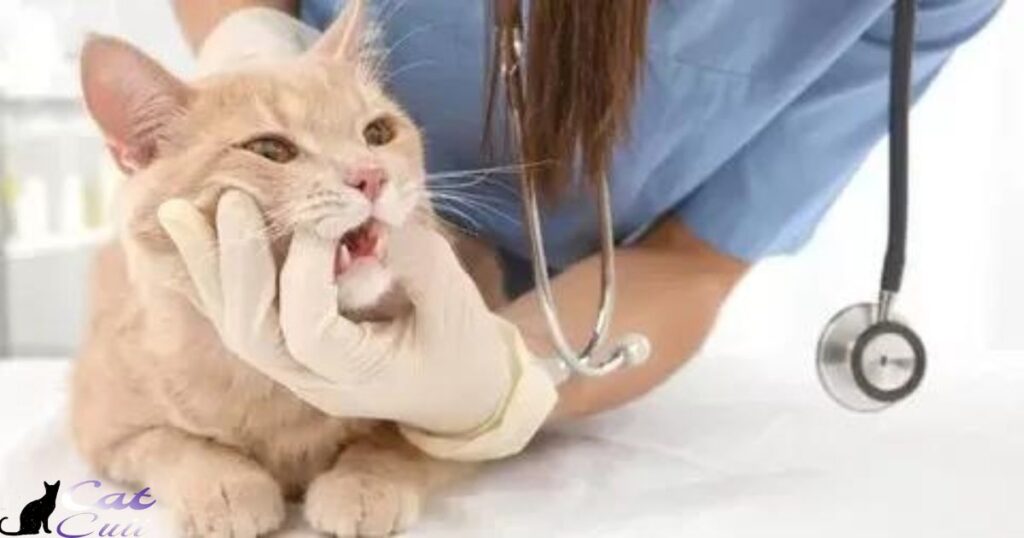
Dental problems refer to issues affecting teeth and gums, such as cavities, gum disease, or tooth decay. These can result from poor oral hygiene, unhealthy eating habits, or certain medical conditions.
Obesity
Obesity is a medical condition characterized by excessive body weight due to an imbalance between calorie intake and expenditure. It can lead to various health complications, including heart disease, diabetes, joint problems, and reduced life expectancy.
Intestinal distress
“Intestinal distress” encompasses a range of digestive issues that cause discomfort or pain in the abdomen. This can include conditions like diarrhoea, constipation, bloating, or cramping, often caused by dietary issues, infections, or underlying health conditions.
Will rabbits willingly eat cat food?
Rabbits may eat cat food if it’s accessible, but it’s not their preferred choice. Cat food lacks the nutrients essential for a rabbit’s well-being. Offering cat food occasionally won’t harm them, but a consistent diet of it can cause digestive problems for rabbits.
Their natural diet mainly consists of hay, fresh veggies, and rabbit-specific pellets. While rabbits might sample cat food out of curiosity, it’s crucial to provide them with the right foods to keep them healthy and thriving.
Can Cat Food Kill A Rabbit
Cat food can be harmful to rabbits and potentially lead to severe health issues or even death. The high protein content in cat food might cause digestive problems in rabbits, affecting their delicate systems.
Cat food lacks essential nutrients specific to a rabbit’s dietary needs, posing a risk of malnutrition if consumed regularly.It’s crucial to prevent rabbits from accessing cat food to ensure their well-being.
Supervising their environment and keeping cat food out of reach helps avoid potential dangers to your furry friend’s health. Feeding rabbits a balanced diet tailored to their nutritional requirements is essential for their overall health and longevity.
FAQ’s
Is it OK for rabbits to eat cat food?
Rabbits can nibble cat food occasionally, but it lacks nutrients vital for them. Regular consumption may cause digestive issues.
What do you feed rabbits when out of food?
During food shortages, offer fresh hay and veggies like kale or carrots. Restock their regular food promptly.
Are cats safe for rabbits?
Cats and rabbits can coexist with supervision. Introduce them carefully to avoid stress. Provide safe spaces for rabbits
Conclusion
In conclusion, the question Will rabbits eat cat food? might have a simple answer, but it’s crucial to understand the implications. While rabbits might nibble on cat food out of curiosity, it’s not suitable for their health. Cat food lacks essential nutrients vital for rabbits and can lead to digestive problems if consumed regularly.
For the well-being of these fluffy friends, it’s best to avoid offering cat food to rabbits altogether. Instead, opt for a diet tailored specifically for rabbits, including hay, fresh vegetables, and rabbit-specific pellets.
